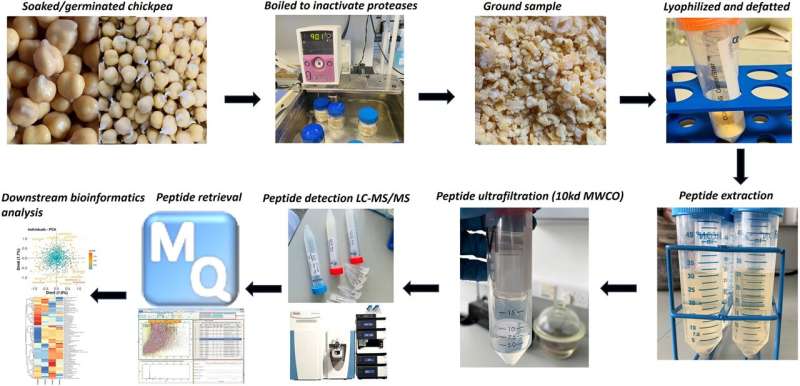This article has been reviewed according to Science X's editorial process and policies. Editors have highlighted the following attributes while ensuring the content's credibility:
fact-checked
peer-reviewed publication
trusted source
proofread
Sprouted legumes are healthier, but what is going on when they sprout?

It's well known that sprouting seeds increases their nutritional value. Researchers led by Professor Denis Shields from University College Dublin in partnership with the health food company The Happy Pear have uncovered some surprising facts about how the sprouting process varies over time and the strain of seed.
The findings are published in the journal PLOS ONE.
This study looked at what happens inside chickpeas as they sprout or germinate. It focused on how special proteins called enzymes break down other proteins in the seed over time. This process helps the seed grow into a healthy plant. Postdoctoral researcher in the Shields group, Dr. Indrani Bera conducted this research as part of a Marie-Curie/Enterprise Ireland research fellowship.
Professor Denis Shields said, "Before Indrani conducted this study, we thought the enzyme activity would be a simple switch that gets turned on right after the seeds are soaked and swell up. However, that's not what we found at all."
Describing the study, Dr. Bera explained, "I was able to detect different enzymes from the pattern of digestion they left behind. What surprised us was that, over time, different enzymes take turns breaking down proteins to release the nutrients. Not only that, I found that the pattern was very different between two common strains of chickpea, the yellow kabuli and the smaller brown desi, which is commonly eaten in my home country of India."
Prof Shields continued, "What Indrani's study highlights is that we need to explore the various health benefits of the different stages of germination, and of different strains. This could help in reducing food allergens, which are protein segments that can be broken down by the kind of enzymes that we are studying. Our next steps now are to explore how the enzymes of different seeds might act in releasing nutrients from each other's proteins."
Darragh Flynn, co-director of The Happy Pear commented, "We are delighted to have been working to help Dr. Bera in her study. The Happy Pear is keen to promote plant-based diets that support good health. We love any studies that help us to understand how sprouts and chickpea hummus products may be made even more nutritious."
Plant proteins are becoming increasingly important as a means of meeting nutritional requirements while minimizing the impacts on climate change and improving health. Key to having more plant-based protein in the diet is developing foods that are more easily digested and are well tolerated.
Legumes contribute strongly to plant-derived protein intake in human diets, particularly among vegetarians and vegans. The chickpea is the most important of the legumes in the diets of people in African and Asian countries.
Until now, the process of protein breakdown and peptide release from the different sets of major legume proteins was not well understood. This is the first study of its type.
More information: Indrani Bera et al, Motif mapping during chickpea germination reveals a complex sequential activation of different proteolytic activities, PLOS ONE (2024). DOI: 10.1371/journal.pone.0307481
Journal information: PLoS ONE
Provided by University College Dublin



















